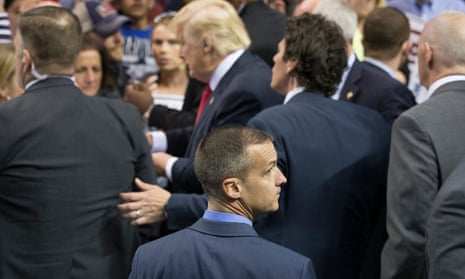After sweeping aside his Republican rivals, Donald Trump and his advisers must now build a campaign for the general election that shows he is not just a brash insurgent.
Trump tried to display some discipline on Tuesday night during a speech at a golf club in upstate New York, following a turbulent few days when senior Republicans have accused him of outright racism him for his remarks about an Indiana-born judge of Mexican heritage.
He was surprisingly restrained, spoke from a prepared text using a teleprompter and did not once mention his signature proposal to build a wall on the Mexican border.
The visible signs of control come as the Trump campaign also appears to have settled down after weeks of infighting. Sources within the campaign told the Guardian that the conflicts between longtime campaign manager Corey Lewandowski and veteran strategist Paul Manafort have grown less heated in recent weeks as the two have started to develop a better working relationship.
The campaign is now working with the Republican National Committee to build up a ground game across the country.
While Trump has relied upon a bare-bones campaign staff to win the Republican primary, there is a realization that a different structure is needed to beat Hillary Clinton. As one source familiar with the campaign noted: “You think we can really win a general election with 70 people?”
By contrast, Clinton has more than 10 times as many staffers and has been deploying key people to swing states for months in preparation for the general election.
One important contribution to the growing unity is the firing of Rick Wiley, a veteran Republican political operative and former presidential campaign manager for Governor Scott Walker of Wisconsin.
Wiley, who was hired and then fired in a 40-day period by Trump, was described by one person familiar with the campaign as contemptuous of those who had worked for Trump before he arrived, and as having tried to fit “round pegs in square holes”, reshaping the campaign to meet his own idea of what it should be.
Wiley has since been replaced by Jim Murphy, another veteran operative who ran the RNC’s independent expenditure efforts in 2012.
This still does not mean that Trump is running a conventional campaign, however.
On Monday Trump himself jumped in on a call with surrogates, who support him and are used to spread his message, which would typically be run by staffers.
He urged those who supported him to continue to defend his attack on Judge Gonzalo Curiel, who allowed the release of some unflattering documents from a lawsuit against Trump University.
Although Curiel is of Mexican heritage, he was born and raised in Indiana. While the Trump campaign issued a long statement which did not sound at all like the candidate on Tuesday afternoon, pledging: “I do not intend to comment on this matter any further,” Trump nevertheless addressed the issue in an interview later that night with Fox’s Sean Hannity.
Trump will seek to take advantage of all the traditional tools of electoral politics without undermining his unique persona. Much of the conflict between the Manafort camp and Lewandowski revolved around whether Trump should become a conventional candidate, with a disciplined message, as Manafort wished, or continue to be provocative in line with Lewandowski’s “let Trump be Trump” mantra.
The challenge is finding the balance on issues from Trump’s use of a teleprompter for speeches to traditional television advertising, which the campaign was averse to during the Republican primary season.
The challenge isn’t just for Trump’s campaign – at least three rival Super Pacs have been established to support his candidacy and without coordination they could overlap, competing for those Republican megadonors who have expressed willingness to open their checkbooks for Trump.
- This article was amended on 8 June 2016. The name of the judge Trump has attacked is Gonzalo Curiel, not Gustavo Curiel as a previous version stated.

Comments (…)
Sign in or create your Guardian account to join the discussion